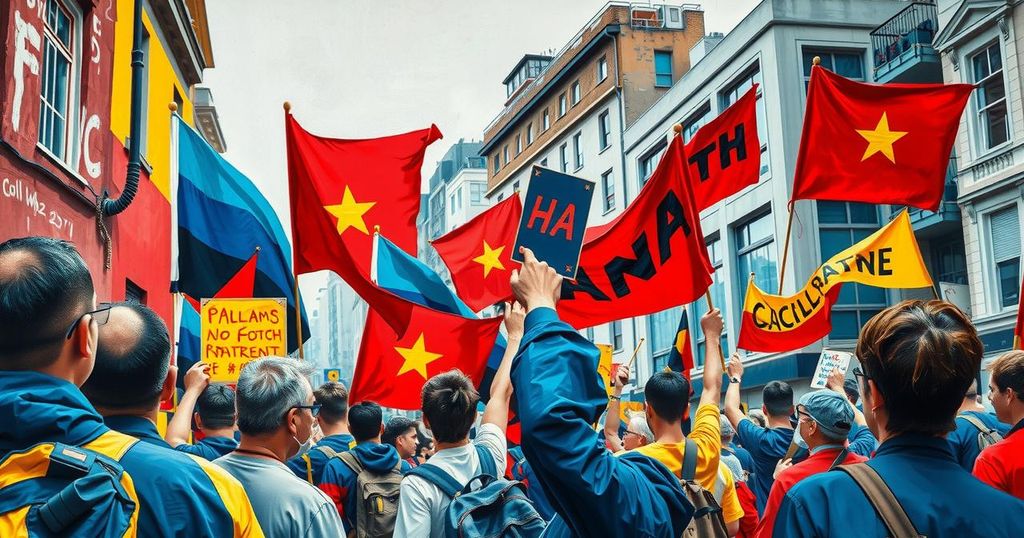Protests in Mozambique have escalated since late October 2024, driven by public outcry over police violence and disputed election results. The unrest prompted similar demonstrations in Angola, as citizens rally against economic hardships and demand accountability. The political landscape reflects tensions between traditional power holders and emerging opposition, particularly the rise of the PODEMOS party. Human rights violations amid government crackdowns have drawn international concern.
Since late October 2024, Mozambique has experienced a surge in protests, initially sparked by the killings of two political figures, Elvino Dias and Paulo Guambe. The protests evolved, reflecting widespread frustration with police brutality and electoral distrust after the FRELIMO party’s continued dominance in elections. These protests drew participants from diverse social backgrounds, voicing grievances in public spaces while expressing their disapproval through music, notably the protest hymn “People in Power” by Azagaia.
Despite the ascension of newly elected officials, public unrest persisted, leading Venâncio Mondlane to call for a general strike in January. Protesters voiced their anger regarding police violence towards citizens, further aggravated by reports of over 300 deaths and 600 injuries due to excessive force during these demonstrations, as documented by the organization Plataforma Decide.
The political milieu in Mozambique is dominated by FRELIMO, which has held power since independence in 1975. The opposition, primarily RENAMO, and MDM, struggled in the recent elections against PODEMOS, a newer party gaining traction due to public dissatisfaction with the existing regime, corruption, and economic disparities. Mondlane’s leadership promised a fresh approach characterized by dialogue and investment in critical areas like housing. His political orientation diverges, as he expresses admiration for notable far-right leaders.
The 2024 elections were marred by allegations of electoral misconduct, including intimidation and violence. While RENAMO and MDM rejected the election results, calling FRELIMO’s governance fraudulent, they were still invited to dialogue aimed at addressing post-election grievances. Continued protests, reflecting popular outrage, have called for the annulment of the elections amidst serious accusations of electoral fraud.
The governmental response to the protests has been excessively combative, with security forces deploying various crowd dispersal tactics, resulting in significant casualties across affected provinces. Human rights organizations have condemned these actions and the arbitrary detentions of individuals involved in protests, calling for international attention to validate the seriousness of these human rights breaches.
In Angola, parallels exist with Mozambique, as citizens similarly grapple with economic hardships, corruption, and limited freedoms. Amidst unrest in Mozambique, Angolan demonstrators expressed their solidarity, chanting slogans against police violence and calling for accountability. The Angolan government remains unnerved by these developments, attempting to suppress civil expression in light of their own political history.
Civil society activism within Angola is evolving, learning from the Mozambican protests to adopt strategies that promote political expression and advocate for human rights. Initiatives like “Conversations from our yard” highlight the importance of discourse on nonviolence and governance strategies. Reports from local NGOs have documented significant human rights violations, emphasizing the critical need for monitoring the right to protest within Angola and preparing for further evaluations into 2025.
The protests in Mozambique signify strong public discontent following a contentious electoral process and police brutality, sparking similar movements in Angola. As both nations face common challenges of corruption and a lack of democratic freedoms, the mobilization of civil society in Angola reflects a growing awareness and willingness to demand accountability from the government. The heavy-handed response of security forces in Mozambique has drawn international condemnation, calling attention to the urgent need for dialogue and reform. The ongoing situation underscores the interconnectedness of socio-political dynamics within the Central African region.
Original Source: globalvoices.org




